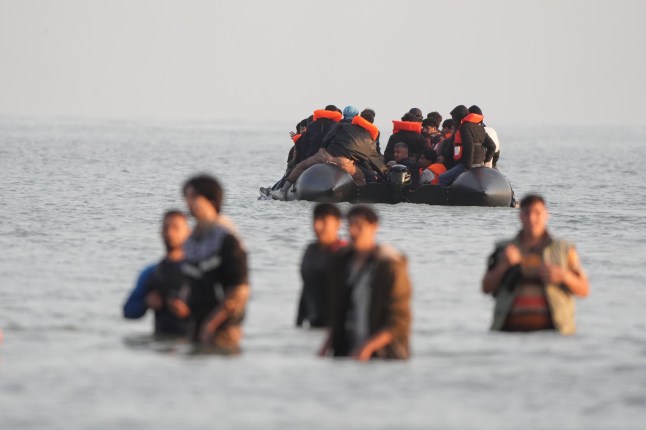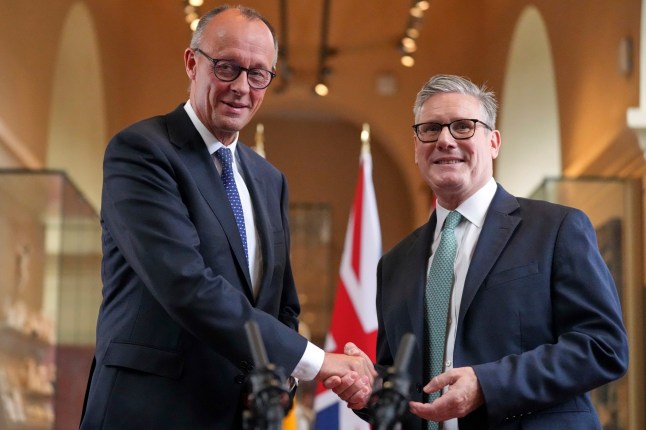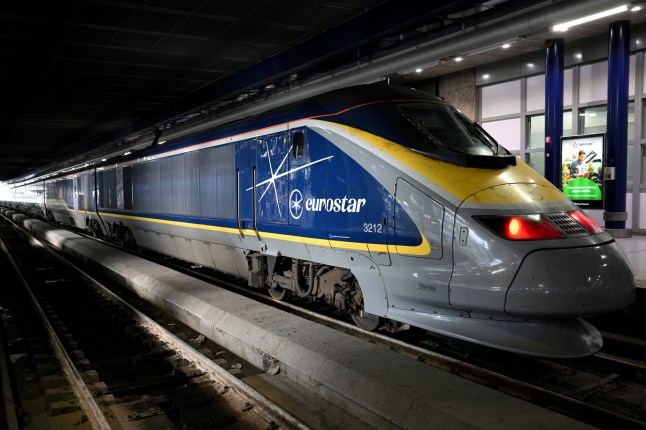
The government hopes closer co-operation with European countries will stem the flow of illegal migration to the UK (Picture: Gareth Fuller/PA Wire)
Sir Keir Starmer has unveiled the latest element in his plan to tackle illegal migration to the UK by working more closely with Europe.
After announcing a ‘one in,one out’ policy with French President Emmanuel Macron last Thursday,today was the turn of German Chancellor Friedrich Merz.
He came to London this afternoon for talks with the Prime Minister about closer alliance on issues like defence – and tying up a big loophole exploited by people-smugglers.
In Germany,there is currently no law that criminalises the aiding of people-smuggling.
That has allowed gangs who organise hazardous trips across the English Channel in small boats to hide their equipment in German warehouses as they make their way across the continent.
Last year,Home Secretary Yvette Cooper came close to a deal with the previous government led by Olaf Scholz.
 The two leaders signed the so-called Kensington Treaty at the V&A Museum in London (Picture: Frank Augstein/PA Wire)Starmer said: ‘Chancellor Merz’s commitment to make necessary changes to German law to disrupt the supply lines of the dangerous vessels which carry illegal migrants across the Channel is hugely welcome.’The announcement came as the two leaders signed a deal titled the Kensington Treaty at the V&A Museum in London – the first treaty between the UK and Germany since the end of World War Two.It includes an agreement to allow some British visitors to Germany to use e-gates at the airport,initially applying to frequent visitors by the end of next month.School exchange visits and a taskforce looking into the potential of direct train services between the two countries are also included.It’s hoped passengers will be able to catch a train to Germany and back again within the next decade.More broadly,there are elements focusing on increased cooperation in defence and security.
The two leaders signed the so-called Kensington Treaty at the V&A Museum in London (Picture: Frank Augstein/PA Wire)Starmer said: ‘Chancellor Merz’s commitment to make necessary changes to German law to disrupt the supply lines of the dangerous vessels which carry illegal migrants across the Channel is hugely welcome.’The announcement came as the two leaders signed a deal titled the Kensington Treaty at the V&A Museum in London – the first treaty between the UK and Germany since the end of World War Two.It includes an agreement to allow some British visitors to Germany to use e-gates at the airport,initially applying to frequent visitors by the end of next month.School exchange visits and a taskforce looking into the potential of direct train services between the two countries are also included.It’s hoped passengers will be able to catch a train to Germany and back again within the next decade.More broadly,there are elements focusing on increased cooperation in defence and security. The Eurostar could soon be taking passengers across the German border (Picture: Nicolas Tucat/AFP)Last Thursday,the PM stood alongside France’s Emmanuel Macron at a press conference to announce a new strategy aiming to stop illegal migrants wanting to come to the UK.The so-called ‘one in,one out’ system would mean people who cross the Channel in small boats are sent back to the continent in exchange for asylum seekers with genuine British links.While this would initially mean no change in the number of people arriving in the UK,it’s hoped migrants would be deterred from making the trip if they think there’s a chance they won’t get to stay.However,reports suggest the plans would start small.According to French newspaper Le Monde,around 50 migrants a week would be swapped at first – meaning only a fraction of small boat arrivals would be sent back under the deal.The government denied there were fixed numbers for the early stages of the scheme,but Starmer said the scope would ‘ramp up’ following the pilot.More than 21,000 people have crossed the English Channel in small boats from France so far in 2025,the highest number ever for this point in the year.Last week,Macron called for the UK to address incentives for people to attempt crossings,such as the availability of jobs for those who have arrived illegally.The Home Office has announced an extension of Right to Work checks to gig economy and zero-hours workers,as well as a boost in action by Immigration Enforcement teams.
The Eurostar could soon be taking passengers across the German border (Picture: Nicolas Tucat/AFP)Last Thursday,the PM stood alongside France’s Emmanuel Macron at a press conference to announce a new strategy aiming to stop illegal migrants wanting to come to the UK.The so-called ‘one in,one out’ system would mean people who cross the Channel in small boats are sent back to the continent in exchange for asylum seekers with genuine British links.While this would initially mean no change in the number of people arriving in the UK,it’s hoped migrants would be deterred from making the trip if they think there’s a chance they won’t get to stay.However,reports suggest the plans would start small.According to French newspaper Le Monde,around 50 migrants a week would be swapped at first – meaning only a fraction of small boat arrivals would be sent back under the deal.The government denied there were fixed numbers for the early stages of the scheme,but Starmer said the scope would ‘ramp up’ following the pilot.More than 21,000 people have crossed the English Channel in small boats from France so far in 2025,the highest number ever for this point in the year.Last week,Macron called for the UK to address incentives for people to attempt crossings,such as the availability of jobs for those who have arrived illegally.The Home Office has announced an extension of Right to Work checks to gig economy and zero-hours workers,as well as a boost in action by Immigration Enforcement teams.United News - unews.co.za